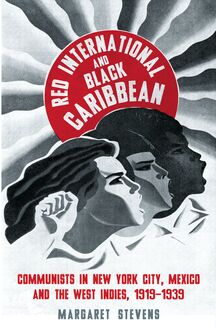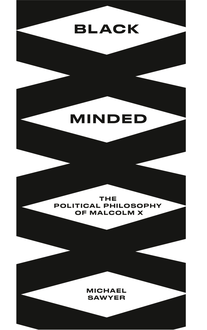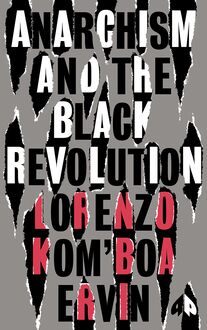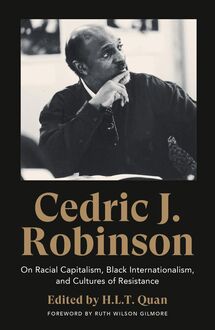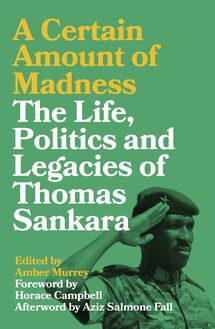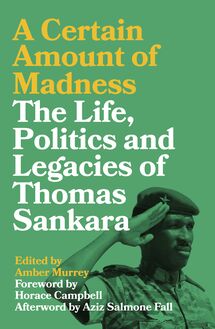Black Minded , livre ebook
99
pages
English
Ebooks
2020
Vous pourrez modifier la taille du texte de cet ouvrage
Obtenez un accès à la bibliothèque pour le consulter en ligne En savoir plus
Découvre YouScribe et accède à tout notre catalogue !
Découvre YouScribe et accède à tout notre catalogue !
99
pages
English
Ebooks
2020
Vous pourrez modifier la taille du texte de cet ouvrage
Obtenez un accès à la bibliothèque pour le consulter en ligne En savoir plus
Known as 'the angriest black man in America', Malcolm X was one of the most famous activists to ever live. Going beyond biography, Black Minded examines Malcolm X's philosophical system, restoring his thinking to the pantheon of Black Radical Thought.
Michael Sawyer argues that the foundational concepts of Malcolm X's political philosophy - economic and social justice, strident opposition to white supremacy and Black internationalism - are often obscured by an emphasis on biography. The text demonstrates the way in which Malcolm X's philosophy lies at the intersection of the thought of W.E.B. Du Bois and Frantz Fanon and is an integral part of the revolutionary politics formed to alleviate the plight of people of African descent globally.
Exploring themes of ontology, the body, geographic space and revolution, Black Minded provides a much-needed appraisal of Malcolm X's political philosophy.
Acknowledgments
Introduction
1. Ontology
2. The Body
3. Geographic Space
4. Revolution
Conclusion
Notes
Index
Black Minded
Black Critique
Series editors: Anthony Bogues and Bedour Alagraa
We live in a troubled world. The rise of authoritarianism marks the dominant current political order. The end of colonial empires did not inaugurate a more humane world; rather, the old order reasserted itself.
In opposition, throughout the twentieth century and until today, anti-racist, radical decolonization struggles attempted to create new forms of thought. Figures from Ida B. Wells to W.E.B. Du Bois and Steve Biko, from Claudia Jones to Walter Rodney and Am lcar Cabral produced work which drew from the historical experiences of Africa and the African diaspora. They drew inspiration from the Haitian revolution, radical black abolitionist thought and practice, and other currents that marked the contours of a black radical intellectual and political tradition.
The Black Critique series operates squarely within this tradition of ideas and political struggles. It includes books which foreground this rich and complex history. At a time when there is a deep desire for change, black radicalism is one of the most underexplored traditions that can drive emancipatory change today. This series highlights these critical ideas from anywhere in the black world, creating a new history of radical thought for our times.
Also available:
Moving Against the System:
The 1968 Congress of Black Writers and the Making of Global Consciousness
Edited and with an Introduction by David Austin
A Certain Amount of Madness:
The Life, Politics and Legacies of Thomas Sankara
Edited by Amber Murrey
Cedric J. Robinson:
On Racial Capitalism, Black Internationalism, and Cultures of Resistance
Edited by H.L.T. Quan
Red International and Black Caribbean Communists in New York City, Mexico and the West Indies, 1919-1939
Margaret Stevens
The Point is to Change the World
Selected Writings of Andaiye
Edited by Alissa Trotz
Black Minded
The Political Philosophy of Malcolm X
Michael E. Sawyer
First published 2020 by Pluto Press
345 Archway Road, London N6 5AA
www.plutobooks.com
Copyright Michael E. Sawyer 2020
The right of Michael E. Sawyer to be identified as the author of this work has been asserted by him in accordance with the Copyright, Designs and Patents Act 1988.
British Library Cataloguing in Publication Data
A catalogue record for this book is available from the British Library
ISBN 978 0 7453 4073 9 Hardback
ISBN 978 0 7453 4074 6 Paperback
ISBN 978 1 7868 0601 7 PDF eBook
ISBN 978 1 7868 0603 1 Kindle eBook
ISBN 978 1 7868 0602 4 EPUB eBook
This book is printed on paper suitable for recycling and made from fully managed and sustained forest sources. Logging, pulping and manufacturing processes are expected to conform to the environmental standards of the country of origin.
Typeset by Stanford DTP Services, Northampton, England
Simultaneously printed in the United Kingdom and United States of America
Dedicated to my parents Ernest and Theresa Sawyer
Contents
Acknowledgments
Introduction
1. Ontology
2. The Body
3. Geographic Space
4. Revolution
Conclusion
Notes
Index
Acknowledgments
The most honest people to whom I mentioned that I was writing a book on Malcolm X asked, what new thing could possibly be said about him? It is only because of the unequivocal support of my dissertation chair, Professor Barrymore Anthony Bogues, that I had the confidence to imagine that this project might, in some small way, contribute to the work that has already so ably taken up the figure of Malcolm X and endeavor to say something new, however incremental.
Throughout this process I have benefited from the unending support of friends and colleagues at Colorado College, most prominently, President Jill Tiefenthaler, Provost Alan Townsend, Dean of Students Mike Edmonds and Professor Jonathan Lee. During the latter stages of this project I was fortunate enough to be appointed Distinguished Visiting Professor of English and the Fine Arts at the United States Air Force Academy where I had the honor of teaching incredibly talented and intellectually curious cadets who asked probative and clarifying questions about the text in progress.
I owe a special type of gratitude to two members of The Four Reprieved, Douglass Too Short Wilson and Awall QueMonger Gbadamosi, who checked on me every day in ways explicit and implied to ensure I brought this ship to shore. F.I.E.T.T.S.
My partner Dr Manya Whitaker makes all of this possible with her support and scholarly example.
My two college-student children have been helpful in ways it is hard to quantify. Ashley with her practical questions and Ellis (who shares a birthday with Malcolm X) for his encouragement.
Finally, none of this would be possible without my parents to whom this book is dedicated. This book is written from a place of love and I learned that from the place of peace and comfort they have always provided.
Introduction
Many will ask what Harlem finds to honor this stormy, controversial and bold young captain - and we will smile.
Ossie Davis
This book came to be from a sudden awareness of my unconscious erasure of Malcolm X from the intellectual genealogy I was assembling to complete my dissertation in graduate school. The work of Frantz Fanon had driven me to graduate school and my studies focused on the complexity of W. E. B. Du Bois to the point that Malcolm X occurred to me, but never in the same way that I approached other thinkers. This is likely because the thought of Malcolm had been overcome by his acts. Or, perhaps more troubling, the speeches of this Black American just didn t seem to fit among the pantheon of philosophers, theorists, historians, writers and artists I was studying. As I was attempting to resolve a difficult section of writing, I had come across the iconic photo of H. Rap Brown with Stokely Carmichael and Amiri Baraka, n e LeRoi Jones, and I decided to write to Rap, who is now known as Jamil Abdullah Al-Amin, in prison to get his take on what I was trying to pull together with respect to Fanon.
I included a large sample of the dissertation and a few weeks later I received a kind note from him; a week or so after that, he phoned. During one of our first conversations I raised the question of Fanon and his import to the intellectual tradition I was working through and Al-Amin stated the following:
El-Hajj Malik el-Shabazz is significant in that his example is the watermark of the struggles we experience over here. We re the only group on the planet that sic an African-American male, by the time he reaches 12 years old, has to make life and death decisions every time he leaves his home. 1
I had not asked Al-Amin about Malcolm X in that my focus was on Fanon and I understood Wretched of the Earth to be the urtext for the radical political tradition that Al-Amin exemplifies. Jamil Al-Amin sped by the question of Fanon s thought and settled on what he called the example, what I took to be something I have chosen to call the embodied philosophy in motion of Malcolm X, as the critically important touchstone for the ethical practice of radical politics. This caused me to realize that there was something that needed to be done in considering the embodied praxis of radical politics by Malcolm X for its philosophical intentionality. Further, it required me to understand that privileging the written word or the pronouncement of specific philosophical or theoretical intent is not the limit of what can be considered serious philosophy. I was selling Malcolm X short in an effort to be considered a person who took up serious intellectual complexity: that was a profoundly irresponsible position. Malcolm X is obviously not the only example of this unconscious marginalization. I am aware that this goes, probably more poignantly, for feminist and queer thinkers who are also labeled as activists, as if that moniker renders philosopher an impossibility. Malcolm X, among others, deserves better: the ambition of this book is to propose a different way to think about this life and its example, in the parlance of Jamil Al-Amin.
The conversations with Al-Amin were generative for this text but what remained (and remains) unsaid between us is perhaps the most provocative element of the manner in which the example of Malcolm X has framed the political praxis and life choices of an absolute radical like Jamil Abdullah Al-Amin. Readers may be familiar with the fact that Jamil is serving life in prison for the murder and attempted murder of police officers who he asserts were coming to murder him. He was convicted of the murder of one officer and the attempted murder of another after being taken into custody fleeing the state of Georgia. The question that I have never asked Al-Amin, in deference to censoring the nature of our correspondence to preserve his telephone privileges while imprisoned, is quite simply: how did he allow himself to be arrested relatively without incident, after a shootout with officers who were putatively trying to serve him with a warrant?
The answer to the question is of course one that has to come from Al-Amin and he, perhaps, may not have a clear response in that there are likely many circumstances surrounding both encounters that are difficult to keep track of, let alone assemble into a coherent, explanatory narrative. But isn t that the business of philosophy and theory? Endeavoring to find abstract systems of understanding to establish a cause and effect relationship between thought and action? There is a way in which we can distill this concern down to the utility of social structures of oppression as, on one hand, recognized as legitimate, and on the other, useful for radical politics, for those engaged in projects of revolutionary alteration of ways of being. The question for Al-Amin would be: how did he allow himself to be taken into custody and held to account for an action that was literally designed to prevent him from being ta

